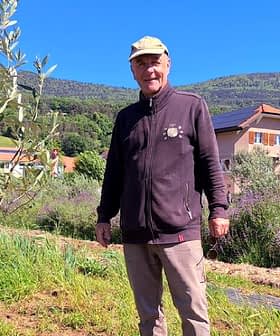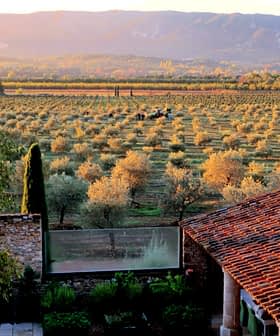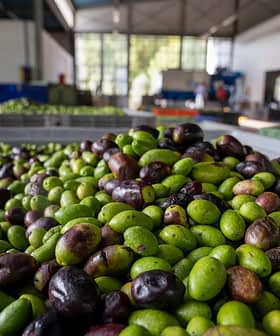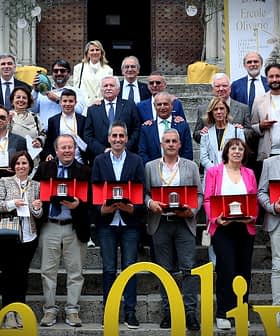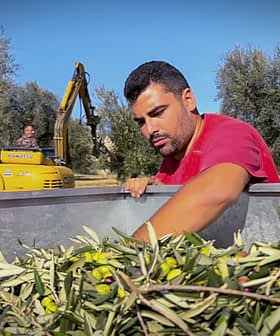Organic Farming, High Quality Often Hand In Hand
Farms like Antica Quercia Verde, among the best organic brands of the year, are contributing to Italy's leadership in the sector.
 Josiane Ferlan harvesting at Antica Quercia Verde
Josiane Ferlan harvesting at Antica Quercia VerdeAntica Quercia Verde won two Gold Awards at the NYIOOC for their organic olive oil from Tuscany. The farm, managed by Josiane Ferlan and Pietro Zecchini, is located near the hermitage of Le Celle, with the olive grove facing south. The organic farming trend in Italy is growing, with consumers increasingly seeking products made without synthetic fertilizers.
Antica Quercia Verde obtained two Gold Awards in a row at the NYIOOC with an organic extra virgin olive oil made on the hills of Tuscany. “The orchard’s soil has always been chemical-free,” said Josiane Ferlan, who runs the farm with her husband, Pietro Zecchini and their sons Joshua and Jeremy. “We manage 500 secular plants of Frantoio, Moraiolo and Leccino and a small group of rare and unclassified varieties,” she said about their grove spread over 3.5 hectares (8.6 acres) of terraces facing south, toward the beautiful town of Cortona.
“The olive trees were most likely planted when the terraces that host them were built, so we are talking about some centuries,” Zecchini considered, adding that the position is not the most comfortable due to the steep terrain and a flourishing vegetation that must be constantly keep under control. “We must often use trimmers and brush cutters, and sometimes, among the wild herbs, we plant leguminous green manure crops such as vetch,” he explained.
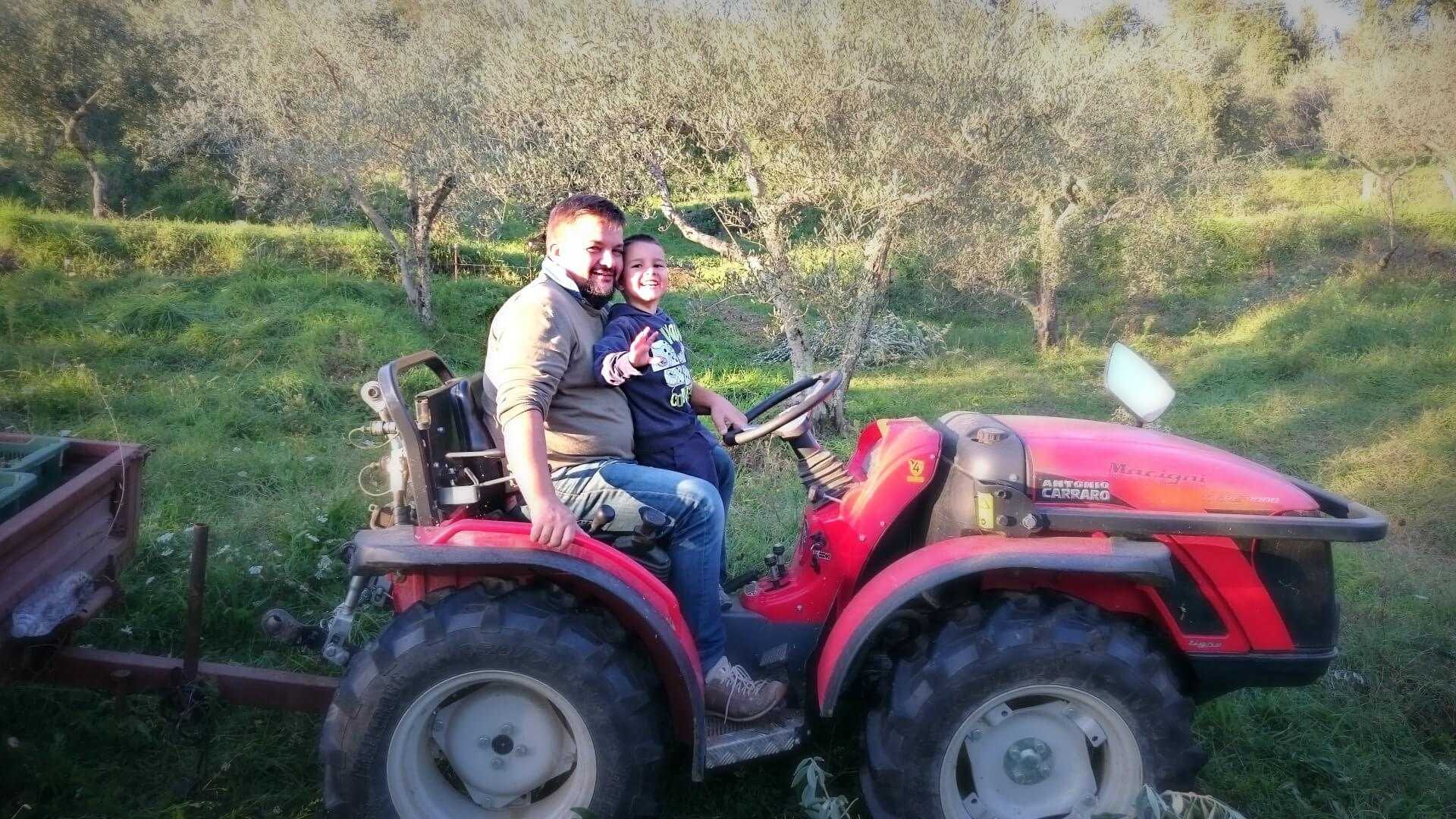
Pietro Zecchini and his son Jeremy
The difficult management of plants is mitigated by a very special atmosphere. The olive grove is right under the hermitage of Le Celle, a convent founded in 1211 by Saint Francis of Assisi, who built the first cells of the structure with his followers.
“Since the old road to the convent passed through our farm, Saint Francis certainly used to walk among these olive trees,” the producer revealed. “I can say that the whole valley is magical as regards to the production of extra virgin olive oil,” Zecchini noted. “When I was a child and went to visit wine cellars in Montepulciano, the winemakers used to say: ‘We here make a good wine, you guys over there make a good oil.’ This means that this has always been recognized as great product, probably thanks to the soil and climate conditions which really seem to be blessed.”
However, last season was particularly challenging. “We start harvesting operations in early October after a very quick ripening,” said Ferlan. She explained that in September fruits weren’t absolutely ready to be picked. First concerns were caused by cold weather in mid-April and early May, then a hot and dry summer halted the vegetative growth. But in early fall fruits developed rapidly. “At the end, tests of the product showed that the polyphenols were much more than those of last year and the acidity was minimal,” she revealed. “Sensory analysis confirmed that our extra virgin olive oil is excellent.”

Josiane Ferlan harvesting at Antica Quercia Verde
This year they decided to delay and reduce pruning, and this well-timed action further protected plants from the effects of the recent cold wave in Italy. In early April, they will go back to olive grove to carry out the appropriate cut operations.
Organic extra virgin olive oil is appreciated by Italian consumers. While in countries like Spain the term ‘organic’ on the label does not seem to create added value, in the Boot the demand of consumers for products made without the use of synthetic fertilizers is increasing.

Angelo Bo
“In the 1970s and 1980s the organic approach has mostly developed in northern European countries,” said Angelo Bo, a Tuscany-based agronomist specialized in organic olive growing. “Therefore, Italy started to export its chemical-free products launching a trend which has grown over the years, also at the national level.”
In organic farming, synthetic fertilizers and pesticides are not allowed and we can use only substances of natural, non-synthetic origin, which must in any case be managed wisely, Bo explained. “According to this approach, we need to work on the agronomic management of olive trees with a view to preserve the right balance and nutrition,” he suggested. “The healthier the plants will be, the less problems arise, and we will be handling with the lowest number of pathogens.”
“We have to say that this method is possible and give excellent results in certain territorial and climatic conditions, and with appropriate olive varieties,” Bo specified. “In this sense, the autochthonous cultivars turned out to be useful. Protection of biodiversity is not only among the purposes of this type of farming but also the first step to take for a successful chemical-free approach.”
Organic olive growers use this method not only for its positive environmental impact, but also for the high levels of quality that it is possible to achieve, as proven by some of this year’s best extra virgin olive oil, like Antica Quercia Verde, Domenica Fiore, and many others.
The growth in production and consumption of organic food in Italy was evidenced in a report recently launched by the SINAB (National Information System on Organic Agriculture), based on a project of the MiPAAF (Ministry of Agricultural, Food and Forestry Policies) carried out by the ISMEA (Institute of Services for the Agricultural and Food Market) and the CIHEAM (International Center for Advanced Mediterranean Agronomic Studies).
According to the document, the areas cultivated under organic methods in Italy have reached 1,796,363 hectares (4,438,909 acres) in 2017, which means an increase of 20.4 percent compared with the previous year.
Olive groves cover 12.6 percent of the surface cultivated under organic farming, with 222,452 ha (549,690 acres), of which 72,053 ha (178,046 acres) are in conversion. The olive tree is therefore among the principal types of farming practiced, with an increase of 23.5 percent, and a growth rate similar to vines (23.4 percent), after fodder crops (342,653 ha — 846,714 acres), pasturelands (321,011 ha — 793,235 acres), and cereals (299,639 ha — 740,424 acres).
The sector is at the center of the country’s development policies and is closely managed by the European and Italian institutions through a system of rules which are continually verified and updated. Thanks to these guarantees, consumers are confident in organic foods.
According to Coldiretti, based on data relating to the large-scale distributors in Italy, retail sales of organic food in 2017 increased by 16 percent. The uninterrupted growth in demand over the last decade stimulated the production in the country, which is currently the European leader for the number of organic companies.


